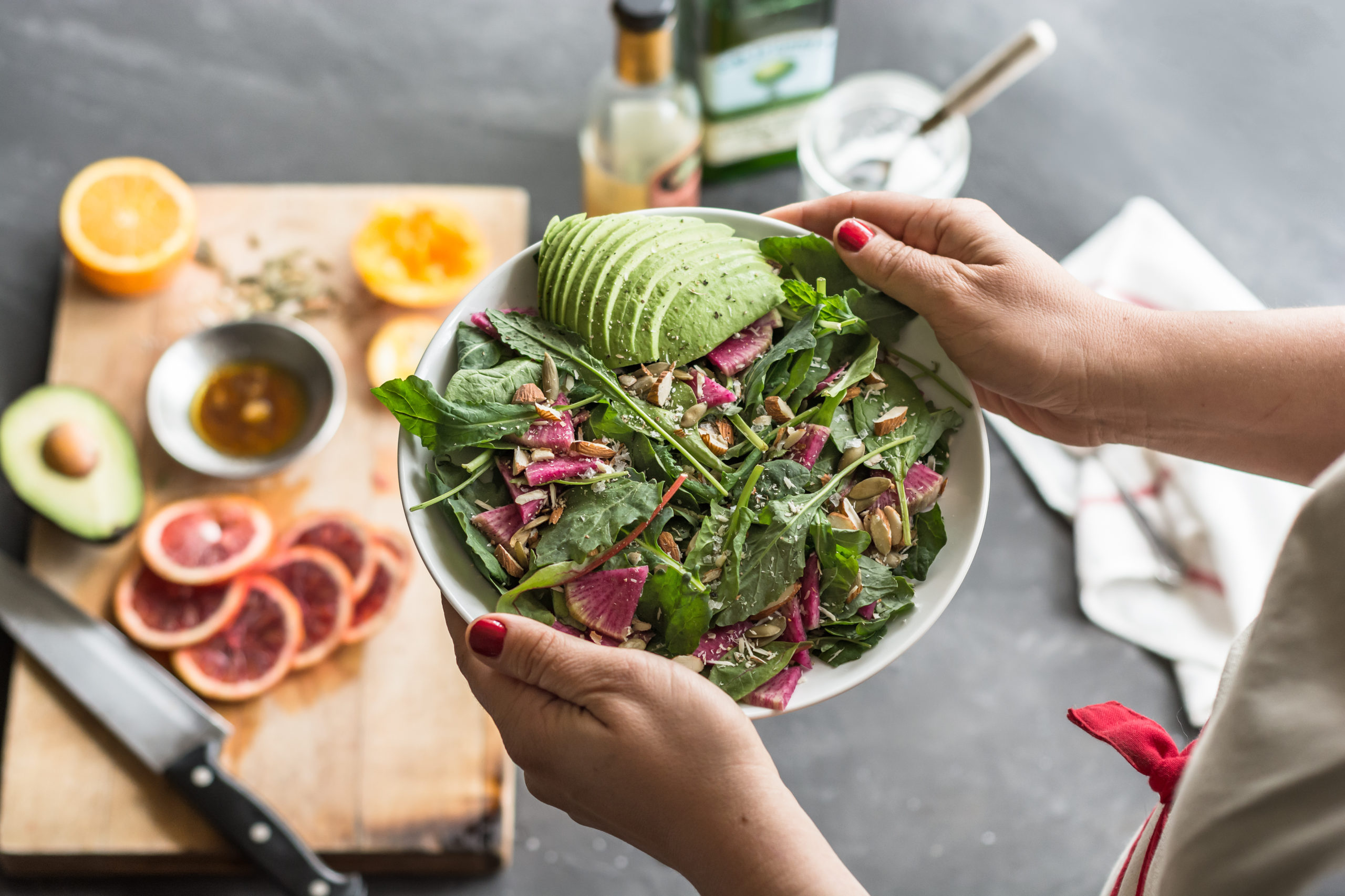
If you haven’t heard of ‘going keto’ or been asked what your intermittent fasting (IF) ‘feeding window’ is, you probably aren’t reading this article. IF and the ketogenic or ‘keto’ diet are two dietary strategies that have gained momentum over the past decade – mainly due to the fact that they’re highly effective. However, there should be a disclaimer in that statement – they tend to be highly effective for male physiology. The same positive results that men get while following these dietary approaches aren’t necessarily what women experience. In fact, these strategies may not even be appropriate for women of a certain age or time in life. Here’s what you need to know.
The Hunger Hormone, Leptin
One of the biochemical effects of the ketogenic diet is that it can decrease leptin levels. (1) Leptin is a hormone that regulates sensations of hunger and fullness, and women and men experience different levels and degrees of sensitivity to this hormone. Typically, women have higher circulating leptin levels than men. (2) Researchers theorise that adequate leptin levels may play an important role in female reproduction and hormone balance. (3)
If leptin levels drop too low in women, especially premenopausal women, oestrogen and progesterone levels may also plummet, leading to hormonal imbalances. (4) Low leptin levels may also decrease thyroid function and increase appetite (5); a sluggish thyroid and higher appetite can promote weight gain, the exact opposite of what most women are striving for when they embark on a ketogenic diet!
Calorie Deprivation and Hormones
IF and a keto diet may negatively affect sex hormones in women more so than men because women’s hormonal systems are very sensitive to calorie deprivation. (6) Both dietary strategies can reduce total food intake, potentially driving caloric insufficiency. (7, 8) Caloric insufficiency can, in turn, deplete sex hormones. It’s critical for a premenopausal, cycling woman to take in enough calories to maintain hormonal homeostasis. For this age group, trying these dietary approaches doesn’t have to be taboo, but moderation and tracking calorie intake is recommended. For example, a cycling woman may want to stick to a 12-hour overnight IF schedule with a 12-hour feeding window. As well, with a keto diet, it may be best for these women to work with a nutrition professional and/or track their food and calorie intake with an app.
Another aspect women of childbearing years should consider, is the impact these diets may have on fertility. Women of healthy or low weight struggling with fertility challenges or irregular menstrual cycles, could experience further problems if they are following an IF or keto diet. It’s always best to talk to a healthcare professional in these cases.
Muscles Mass and Testosterone
Muscles are highly metabolic which means that the more muscle mass you have, the more calories you burn. And yes, men typically have more muscle mass than women making it easier for them to lose weight. (9)
Another advantage men have is higher levels of testosterone. Testosterone can help men lose body fat. (10) A keto diet can further support men by raising testosterone levels – giving them yet another weight loss advantage over women on a keto diet. (11)
History of Disordered Eating
Finally, if you have a history of an eating disorder or disordered eating behaviours, IF and a keto diet may not be appropriate and should only be undertaken with the guidance of your doctor and mental health provider.
Additional Reasons Why You’re Struggling to Lose Weight on IF or Keto
Clearly, there are some biological differences between men and women that may make these dietary strategies more difficult or inappropriate for certain women. However, there are also five additional pitfalls beyond sex differences that can make weight loss elusive for women on an IF or keto program.
- You are not eating enough protein: when you don’t eat enough protein in your diet, your blood sugar becomes more volatile (swinging between high and low), and you’ll tend to overeat other foods, such as carbohydrates, even if you’re engaging in intermittent fasting or eating a keto diet. Conversely, increasing your protein intake while limiting your calorie intake can help prevent a loss of beneficial muscle mass and lead to healthier food choices. (12) Protein is the most satiating macronutrient, so when you eat enough, it becomes easier to regulate your intake of other foods! A healthy protein intake range for many women is 0.8-1.2g of protein per kg of desired body weight.
- You’re not taking in enough calories: fasting too much, such as more than 14 hours every 24 hours, may make it difficult to eat enough food to meet your calorie needs. In addition, some women may undereat on a keto diet. Undereating can deprive your body of the vitamins and minerals for healthy metabolic function. If you need help determining whether you’re eating enough on your current intermittent fasting program or keto diet, consider tracking your food for several days in a food tracking app. This will allow you to see whether you need to eat more to nourish your body.
- You’re really stressed out: stress raises cortisol, which can, in turn, drive weight gain, especially around your midsection. (13) Even the healthiest keto diet or most dialled-in IF routine may fall flat if you are chronically stressed. To break through a weight loss plateau, ensure you’re engaging in daily stress management practices, such as meditation or yoga.
- You’re going to bed too late or not sleeping enough: going to bed late and not getting enough total sleep can hinder your weight loss progress in several ways. For one, when you stay up late at night, you may be more likely to snack; research shows that late-night eating increases the risk of weight gain. (14) A lack of sleep can also drive weight gain by increasing food intake and impairing blood glucose tolerance. (15) Make it a priority to set aside time for 7-9 hours of sleep a night and try to get to bed around 10 pm to avoid the late-night munchies.
- You’re only doing cardio and not lifting weights: engaging in exclusively cardiovascular exercise (such as lots of running or spin classes) with no weight training may increase cortisol driving up your appetite and triggering your body to put on fat rather than burn fat. On the other hand, avoiding a cardio “overdose” and mixing in some weight training can burn fat, helping you overcome a weight loss plateau.
The Bottom Line
Struggling with weight loss when IF or eating a keto diet is frustrating, to say the least, especially for some women! However, the good news is that there are some common factors that, when addressed, can get you back on a healthy weight loss trajectory.
Available upon request.
Share:
Related Posts

Why Would I Test Positive To Foods On A Dietary Antigen Test That I Don’t Eat?
Written by Precision Point Diagnostics | 2025 True food allergies are when the body develops antibodies against a particular food, or a related food. Patients

Mitochondria: The Overlooked Link in the Gut-Brain Axis
Written by Dr Sarah Daglis | 2025 The gut-brain axis is well-established, but there’s more to this dynamic relationship than meets the eye. A vital

Unlocking Respiratory Resilience Through Functional Medicine
Article written by Dr Michelle Clark Naturopathic Doctor Clinical Education Manager, FxMed Published 1 September 2024 People take supplements to improve or optimize their health.

AHCC: Unlocking the Immune Intelligence of Shiitake Mycelia
Article written by Jessica Sanders BSc. (Psy), Dip Nat, Dip Med Herb Technical Projects, FxMed Published 1 September 2024 People take supplements to improve or

Life After Weight Loss Meds
Kathi Head, ND February 20, 2025 You would have to have been spending glorious hours lying on the beach on a desert island not to


